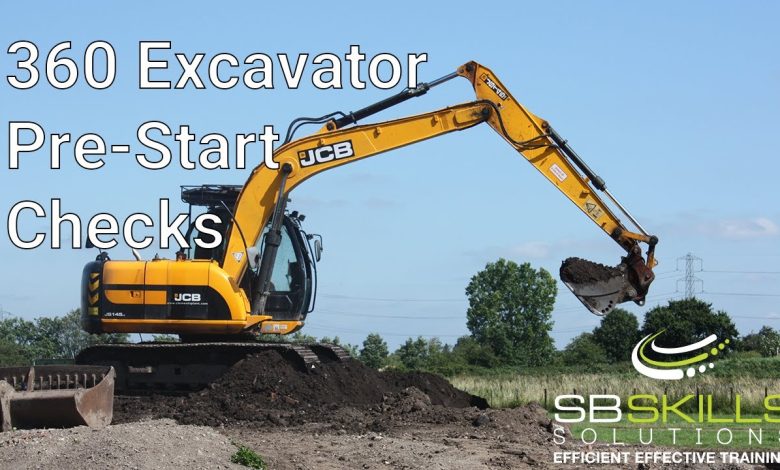Comprehensive Guide to 360 Excavator Training

Excavators are essential machines in the construction industry, providing the power and precision needed to perform various tasks such as digging, lifting, and moving materials. Among the different types of excavators, the 360 excavator stands out for its ability to rotate a full 360 degrees, making it highly versatile and efficient. To operate these complex machines safely and effectively, comprehensive training is crucial. This guide delves into all aspects of 360 excavator training, from safety and certification to courses and industry standards.
The Importance of 360 Excavator Training
Safety and Health Regulations
Safety is paramount in the operation of any heavy machinery, and 360 excavators are no exception. Proper training ensures that operators are well-versed in the safety protocols and health regulations mandated by organizations such as OSHA (Occupational Safety and Health Administration). This knowledge is critical in minimizing accidents and injuries on construction sites.
Industry Standards and Certification
To maintain high standards in the construction industry, operators must meet specific certification requirements. Organizations like NPORS (National Plant Operators Registration Scheme) and CPCS (Construction Plant Competence Scheme) provide certification that validates an operator’s competence and adherence to industry standards. These certifications are often prerequisites for employment and are highly regarded in the industry.
Components of 360 Excavator Training
Courses and Lessons
360 excavator training courses are designed to cover all aspects of machine operation, from basic controls to advanced techniques. These courses typically include both theoretical lessons and practical hands-on training. Key topics covered in these courses include:
- Machine controls and functions
- Safe operation practices
- Maintenance and troubleshooting
- Site safety and risk assessment
Operator Certification and Card
Upon completion of the training, operators must pass a test to earn their certification. This certification is often accompanied by an operator card, which serves as proof of their qualifications. The card is a valuable asset, as it is recognized by employers and regulatory bodies across the industry.
Experience and Skill Development
In addition to formal training, practical experience is crucial for developing the skills needed to operate a 360 excavator efficiently. Many training programs offer on-the-job training opportunities, allowing operators to gain real-world experience under the supervision of experienced professionals. This experience is invaluable in honing their skills and building confidence in their abilities.
The Training Process
Initial Training and Entry-Level Requirements
For those new to the construction industry, entry-level training programs are available. These programs provide a foundational understanding of 360 excavator operation and safety protocols. Entry-level requirements typically include a basic understanding of machinery and physical fitness, as the job can be physically demanding.
Advanced Training and Specialization
For operators looking to advance their careers, specialized training programs are available. These programs focus on advanced techniques and operations, preparing operators for more complex tasks and higher-level positions. Advanced training often includes:
- Detailed maintenance procedures
- Complex excavation techniques
- Operating in challenging environments
- Supervisory skills and team management
Online Training Options
In recent years, online training options have become increasingly popular. These programs offer the flexibility to learn at one’s own pace and are ideal for those who cannot attend traditional classroom-based courses. Online training typically includes interactive modules, video tutorials, and virtual simulations to provide a comprehensive learning experience.
Meeting Industry Standards
OSHA and Health Regulations
OSHA sets stringent health and safety regulations for construction sites. 360 excavator training programs must align with these regulations to ensure compliance. Training covers important topics such as:
- Personal protective equipment (PPE)
- Hazard identification and risk management
- Emergency procedures
- Safe work practices
NPORS and CPCS Certification
NPORS and CPCS are two of the most recognized certification bodies in the construction industry. NPORS offers flexible and cost-effective training solutions, while CPCS is known for its rigorous standards and extensive testing. Both certifications are highly valued and can significantly enhance an operator’s employability.
The Role of Employers and Businesses
Providing Comprehensive Training Programs
Employers play a crucial role in ensuring their operators are adequately trained. Providing access to comprehensive training programs, both in-house and through accredited training providers, is essential. Employers should also encourage ongoing education and skill development to keep operators up-to-date with the latest industry standards and technologies.
Investing in Team Development
A well-trained team is a valuable asset to any construction business. Investing in the development of operators not only enhances their skills but also improves overall productivity and safety on the job site. Employers should foster a culture of continuous improvement and provide opportunities for career advancement.
Career Opportunities and Benefits
High Demand for Skilled Operators
The construction industry is experiencing a high demand for skilled 360 excavator operators. With the right training and certification, operators can enjoy numerous job opportunities and competitive salaries. The ability to operate a 360 excavator is a specialized skill that is highly sought after in various construction projects.
Career Advancement and Specialization
Experienced operators can advance to supervisory or managerial positions, overseeing teams and projects. Specializing in specific types of excavation or operating other heavy machinery can further enhance career prospects. Continuous learning and professional development are key to achieving long-term success in the industry.
Conclusion
360 excavator training is an essential component of a successful career in the construction industry. By meeting industry standards, obtaining certification, and gaining practical experience, operators can ensure they are well-prepared to handle the challenges of operating these complex machines. Employers and training providers play a vital role in delivering high-quality training programs that prioritize safety, compliance, and skill development. With the right training, operators can look forward to a rewarding and dynamic career in the construction industry.




